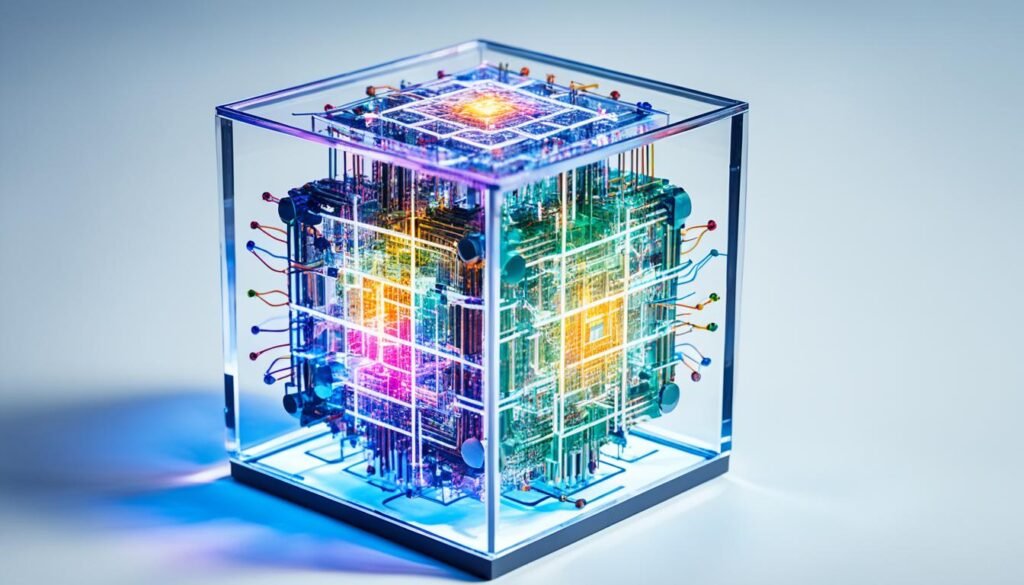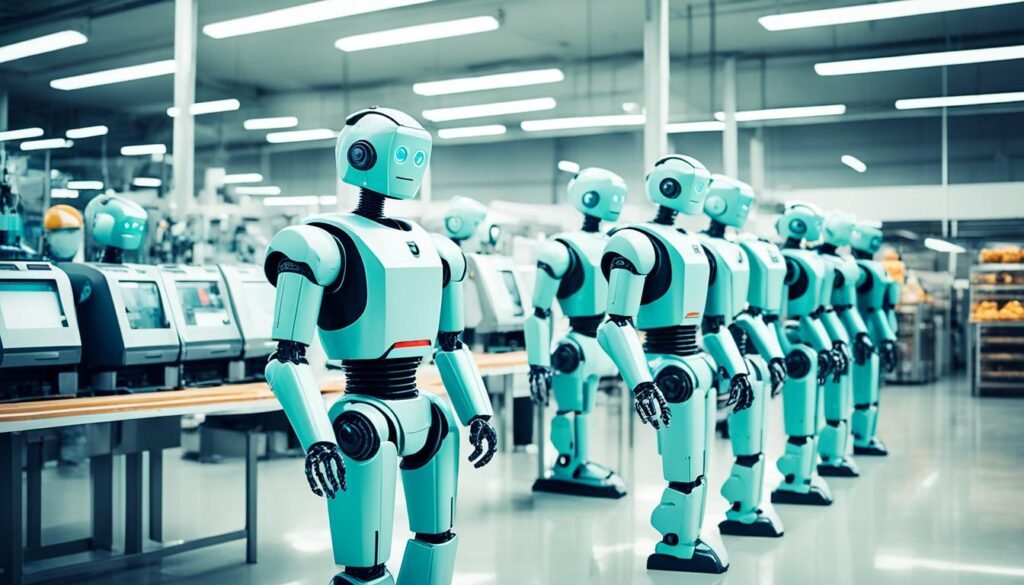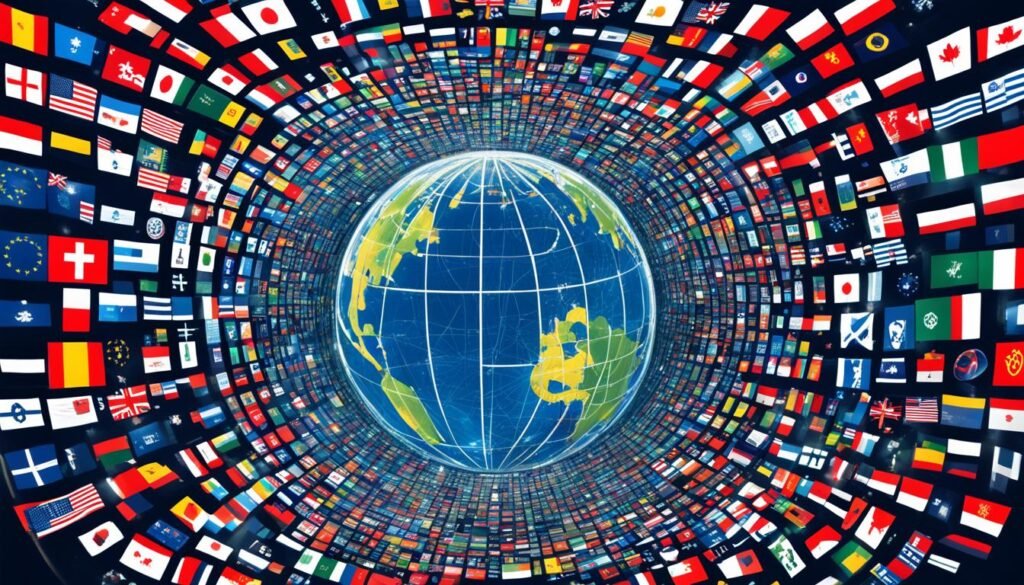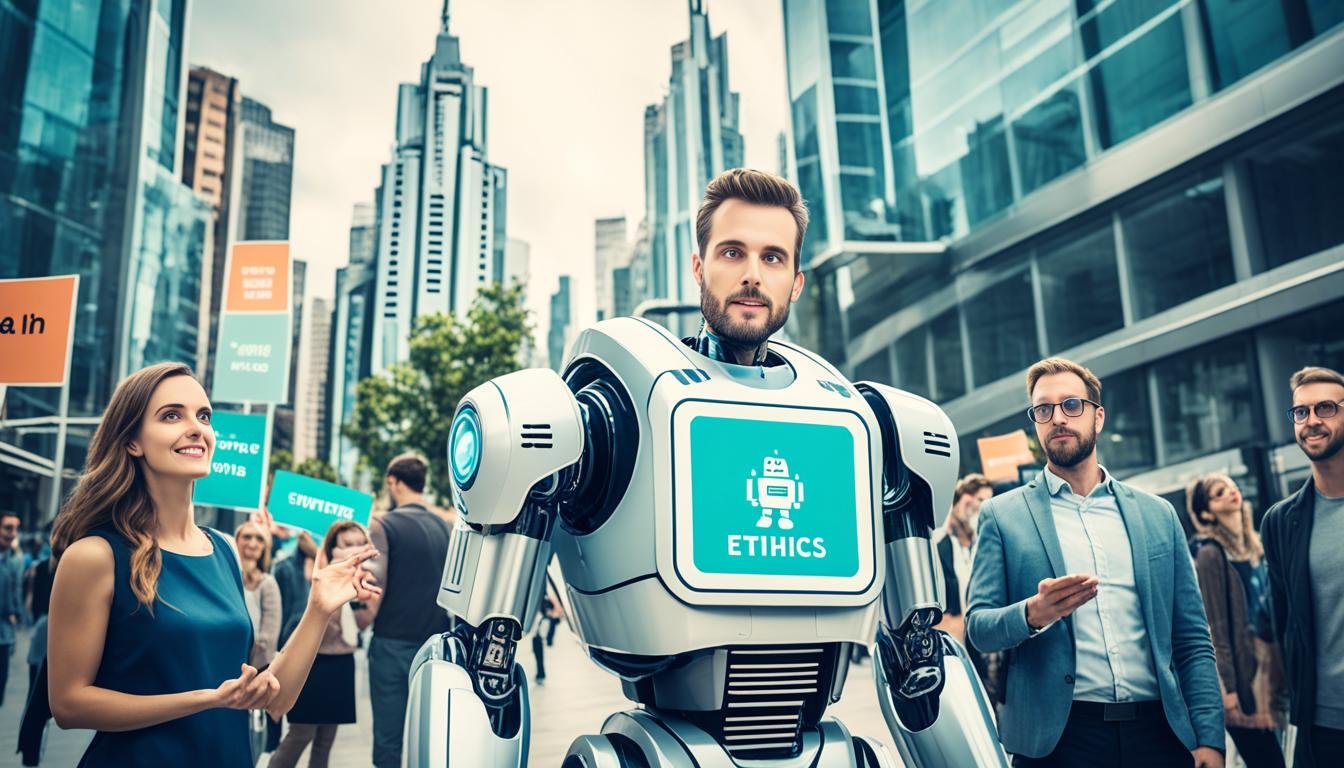Did you know that only 36% of customers feel okay with businesses using AI? At the same time, 72% are worried about its use. The debate on AI ethics is getting louder. It’s vital for both businesses and people to tackle the ethical challenges of this new tech.
AI has opened up many doors, but it also brings risks and ethical worries. We’re talking about bias, discrimination, privacy, and transparency. These are big ethical questions with wide-reaching impacts. This article will look into the main AI ethics issues. It will also share tips on how to handle this powerful tech responsibly.
Key Takeaways
- The debate around AI ethics has intensified as concerns grow about the moral code instilled in AI systems.
- Ethical considerations are particularly crucial in Generative AI, which aims to produce output resembling human thought and language.
- Businesses play a critical role in shaping the ethical framework of AI systems, necessitating collaboration among developers, ethicists, and organizational leaders.
- Regulation and oversight efforts are being undertaken to establish guidelines for ensuring ethical AI use.
- Users have an important role to play in shaping the ethical landscape of AI by making conscious choices and providing feedback on ethical issues.
The Rise of AI: Opportunities and Ethical Concerns
Artificial Intelligence (AI) is becoming more in many areas. It helps make things more efficient, productive, and innovative. But, it also brings up ethical issues that need thought and careful use.
AI’s Impact on Various Industries
AI is changing many industries, like healthcare, transportation, energy, and education. In healthcare, AI helps with diagnoses and treatment plans, making patients’ lives better. In transportation, AI helps with maintenance and finding the best routes, cutting down on pollution and making things run smoother.
AI is also making a big difference in the circular economy, agriculture, fashion, and tourism. It’s pushing for new ideas and making things more sustainable.
Potential Risks and Challenges
AI has many benefits, but there are big ethical worries too. AI systems can keep biases and discrimination, making things unfair. Using AI in making decisions makes us wonder about human judgment and who is accountable.
There are also worries about AI-powered robots and losing jobs because of automation. These are big issues that need careful thought and policies.
To deal with these worries, governments, groups, and the public are working together. They’re making rules, self-regulating, and teaching people about AI. The aim is to make AI good for everyone, promoting innovation while keeping ethics and rights safe.
As AI gets more popular, we need to guide it with strong ethics. We must think about what’s best for people and society. By tackling the challenges and using AI’s benefits, we can move forward with integrity and fairness.
Bias and Discrimination in AI Systems
AI is getting more popular, but so are worries about bias and discrimination in these systems. AI algorithms aim to make decisions automatically. Yet, they can lead to unfair and biased results, especially in hiring, lending, and policing.
The problem of bias in AI comes from the data used to train these algorithms. This data can include biases, making AI systems discriminatory. For example, AI recruitment tools have been shown to unfairly rate CVs from female applicants.
Studies also reveal that object detection algorithms struggle to spot dark-skinned people, which could be dangerous in self-driving cars. Facial recognition systems are less accurate with people of color too.
To tackle bias in AI and discrimination in AI, we need a broad strategy. Using unbiased data and clear algorithms can help. Also, having strong ethics inside a company and outside checks is key for AI fairness and equity.
“Algorithmic bias results in discriminatory hiring practices based on gender, race, color, and personality traits.”
As AI grows, it’s vital for companies to spot and fix bias in their AI systems. This way, AI can make fair, just, and inclusive decisions for everyone.

Privacy and Data Concerns in the Age of AI
AI is getting better fast, thanks to better algorithms and more computing power. This makes privacy and data concerns more important. AI touches many parts of our lives, like customer service and personalized advice. This raises questions about how we use personal data responsibly and ethically.
Ensuring Data Privacy and Security
AI needs a lot of personal data, which worries people about privacy breaches and identity theft. Companies making AI must protect our privacy and rights. They need to use strong data protection methods, like data policies, encryption, and getting user consent.
Informed Consent and Transparency
Privacy is linked to getting people’s okay and being open about how AI uses their data. People should know how their data is handled by AI. Using clear consent and sharing data details can help build trust and lessen privacy worries.
As AI grows, we must focus on privacy and data issues. This ensures AI is developed responsibly and ethically. By using strong data rules and being open and getting user consent, companies can handle AI privacy issues. This way, they can use AI’s benefits fully.
“The right to privacy is not absolute, but it should be jealously guarded in the face of the ever-growing power of the state and corporations to collect and process personal data.”
Transparency and Accountability for AI Decisions
AI systems are now key in many industries, making it vital to be clear and responsible. Their complex algorithms make it hard to see why they make decisions, especially when the stakes are high. This can lead to big problems.
We need to make sure AI systems are clear, responsible, and can be held accountable. This is crucial in fields like banking, healthcare, transportation, and marketing. Here, AI makes big decisions that affect people and society a lot.
In banking, AI chatbots help with customer service and find fraud by spotting odd spending. These AI systems are better than humans at finding fraud. But, we must ensure they make fair and right decisions.
| Industry | AI Application | Transparency and Accountability Challenges |
|---|---|---|
| Banking | Fraud detection, customer service chatbots | Ensuring fair and ethical decision-making, mitigating bias, and explaining AI-driven decisions |
| Healthcare | Diagnosis and treatment recommendations | Addressing the potential for incorrect diagnoses due to machine learning and AI issues, and ensuring patient safety |
| Transportation | Autonomous vehicle decision-making | Determining liability and accountability for damages caused by AI failures |
| Marketing | Data-driven decision-making for targeted campaigns | Preventing detrimental financial impacts on customers due to flawed AI-powered decisions |
| Surveillance and Security | Threat detection and image recognition | Mitigating the risk of discriminatory surveillance targeting marginalized groups due to inaccurate AI algorithms |
There are many ideas to tackle these issues. Some suggest making AI makers responsible, sharing blame among everyone involved, and using tests and rules. The law is also key in setting standards for AI use. This helps reduce risks and keep AI decisions ethical.
As we use AI more in making decisions, focusing on AI transparency and AI accountability is crucial. This ensures AI decision-making is responsible and good for everyone.

ai ethics issues: Addressing the Ethical Implications
Artificial intelligence (AI) is growing fast in many industries. This means we must think hard about its ethical sides. Groups and leaders are setting up rules, making AI review boards, and keeping track of AI decisions.
AI might change jobs and cause some jobs to disappear. Experts say AI could take many jobs in places like factories and farms. This makes us worry about the future of workers who don’t have many skills.
AI also collects a lot of data, which makes us think about privacy. We need strong laws to protect our data and stop AI from being unfair.
- Some suggest a Universal Basic Income (UBI) to help those who lose their jobs. But, this idea makes us wonder if it would make people not want to work or do bad things.
- AI could even threaten our existence, so we need to make sure it’s friendly and shares our values.
- We’re also thinking about how AI might change how we learn, see ourselves, and feel about ourselves.
We need to work together to solve these AI ethics problems. This means talking between leaders, experts, the public, and others. We need to make rules and frameworks that handle AI’s challenges well.
| Ethical Concern | Potential Impact | Proposed Solutions |
|---|---|---|
| Job Displacement | Significant job losses in sectors heavily reliant on manual labor | Retraining and upskilling workforce, exploring Universal Basic Income (UBI) |
| Privacy and Data Concerns | Discriminatory outcomes due to AI data analysis | Robust data protection laws and regulations, informed consent processes |
| Existential Risks | Potential threat to humanity’s existence | Developing “friendly” AI with human values and goals |
By tackling AI’s ethical sides, we can make sure this big change helps us and society. We want to use AI in a way that respects our values and keeps us all well.
Impact on Employment and Job Displacement
The rise of artificial intelligence (AI) has raised concerns about its effect on jobs. As AI gets better, it can do more tasks on its own, replacing human jobs in many fields. This makes people worry that AI could change the job market a lot, leaving many without work.
Studies show AI could have a big effect on jobs. A Writers Guild of America strike was sparked by fears of losing jobs to AI in writing. Also, a study by OpenAI and the University of Pennsylvania found that 80% of US workers could see 10% of their tasks changed by AI. About 19% might see half of their tasks affected.
Retraining and Upskilling Workforce
As AI changes the job scene, teaching workers new skills is key. Jobs that need a lot of manual work or simple tasks are most at risk. But, jobs that need advanced tech and analytical skills are growing.
To tackle this, we need a team effort from governments, industries, and workers. We should create programs that teach workers new skills for an AI-filled job market. Skills like critical thinking, solving problems, and being adaptable are important.
| Sector | AI Impact on Employment |
|---|---|
| Media and Creative Fields | Predictions indicate that bots could replace journalists, columnists, illustrators, cartoonists, and artists, leading to potential job losses in these creative fields. |
| Professional and Technical Occupations | Occupations requiring more education, degrees, and even doctorates may be more exposed to disruption by AI compared to those not needing professional qualifications. |
| Manual and Routine Labor | Industries relying heavily on manual labor or routine tasks are particularly vulnerable to AI automation. |
By working together, we can help workers deal with the changes AI brings to jobs. This way, workers can move forward and find new opportunities in the AI age.

AI Safety and Control Measures
Artificial intelligence (AI) is changing many industries fast. This makes AI safety and control measures very important. The fast growth of autonomous AI systems has made people worry about risks and bad outcomes from using them a lot.
One big worry is AI systems might be biased, make mistakes, or be used for bad things. Studies show even top AI can make errors. For example, Google Photos once showed racial bias. Deepfakes also show how AI tech can be a security risk, with over 75% of a Microsoft API fooled by fake videos.
To fix these issues, we need AI control measures. The European Union has made the AI Act, the first big AI law. In the U.S., there’s no federal AI law yet, but some companies follow GDPR and CCPA rules.
Creating safe and responsible AI systems needs a detailed plan. This means setting strong rules, having industry standards, and giving regulatory bodies the power to check AI use. Being open, accountable, and respecting human rights is key to trust and safety with autonomous AI systems.
As AI changes the world, focusing on AI safety and good AI control measures is vital. Finding a balance between tech progress and ethics lets us use AI’s good sides safely. This protects people, communities, and the planet.
“The move to a post-work society worries people about job loss as AI could replace many jobs in trucking and office work.”
- Set up detailed rules for AI making and using
- Make industry standards for AI safety and security
- Give regulatory bodies the power to check AI use
- Make AI decisions clear and answerable
- Add human rights and ethics to AI design and use
| Metric | Value |
|---|---|
| Percentage of U.S. workers worried about automated tech’s impact | 81% |
| Percentage of time a Microsoft API was fooled by deepfakes | More than 75% |
| Number of countries with strong AI laws | 1 (European Union) |
AI Governance and Regulation: A Global Perspective
The world is moving fast with artificial intelligence (AI), making strong rules and oversight crucial. Countries and groups are setting up rules to handle AI’s ethical issues. The European Union and Brazil are leading the way with their own AI laws. A global effort is key to make sure AI is used right and safely.
International Initiatives and Frameworks
Many countries see the need for AI rules. The OECD has set out principles for AI, focusing on legal and ethical standards. These principles push for AI that respects human rights and democratic values.
The European Union is leading in AI rules with the AI Act. It will sort AI risks into four levels. This will help balance ethics with innovation and growth.
The Bletchley Declaration, backed by 29 countries, sees AI as a chance for global progress. It calls for AI that is safe, focused on people, trustworthy, and responsible. This will help avoid risks around the world.
These efforts show a growing need for global AI rules. By working together, countries can make sure AI benefits everyone. It will focus on ethics, human rights, and what’s best for all of us.

Dealing with AI rules is complex. It’s hard to make laws that are fair, ethical, and support innovation. With new tech like ChatGPT, policymakers must stay quick and flexible. This ensures AI rules keep up with the fast-changing world.
Ethical AI Development: Principles and Best Practices
As AI grows in use across industries, ethical AI development is key. It protects user privacy and prevents biases. It also builds trust and transparency in tech.
Embracing Transparency and Accountability
Transparency is key in ethical AI. Developers must explain how their AI works, what it decides, and its limits. This builds trust and ensures accountability.
Prioritizing Fairness and Avoiding Bias
Ensuring fairness and tackling bias is vital in AI development. This means using diverse data for training, checking AI for unfairness, and making it fairer.
Safeguarding User Privacy and Data Rights
AI must respect user privacy and data rights. This means strong data security, getting user consent, and letting users control their info.
Fostering Collaboration and Shared Responsibility
Working together in the industry and with regulators is crucial for ethical AI. Sharing guidelines, open-source projects, and tackling challenges together helps make AI responsible.
| AI Ethics Principle | Key Practices |
|---|---|
| Transparency |
|
| Fairness |
|
| Privacy |
|
| Collaboration |
|
Following these principles and practices helps organizations make ethical AI. This builds trust, protects rights, and matches societal values. As AI changes, sticking to these ethics is key for its future.
AI and Human Rights: Protecting Fundamental Freedoms
AI is changing the world fast. It’s key to make sure these technologies respect our basic rights. The mix of AI and human rights is a big deal. We need to be careful to keep our freedoms safe.
In March 2024, all 193 UN countries agreed on a big deal. They said AI must respect and protect our rights. This shows how important AI is to our freedoms, like privacy and being treated fairly.
The Universal Declaration of Human Rights guides how we use AI. It’s part of many UN tech rules. The UN Guiding Principles on Business and Human Rights help companies make AI that respects rights too.
But, AI can also be a big risk to our rights. It can lead to unfair treatment and privacy issues in areas like justice and healthcare.
To fix this, we need to make sure AI follows human rights rules. AI should be right for the situation and not overdo it. We must keep AI safe and fair, making sure everyone gets the good and bad parts equally.
By making AI follow human rights, we can make the most of these technologies. This way, AI can help us all and keep our basic freedoms safe. This is key for a fair and just world.
| Key Principles for Ethical AI | Relevance to Human Rights |
|---|---|
| Justification and Proportionality | Ensuring AI systems are necessary and appropriate to achieve legitimate aims, respecting individual rights and liberties. |
| Safety and Security | Identifying and mitigating risks to prevent harmful impacts on human rights, such as privacy violations or discriminatory decisions. |
| Fairness and Non-Discrimination | Promoting equal treatment and preventing bias, protecting the fundamental right to equality and non-discrimination. |
| Environmental and Social Sustainability | Considering the broader impact of AI on human rights, including the right to a clean and healthy environment. |
| Privacy and Human Oversight | Respecting individual privacy and ensuring meaningful human control over AI systems to uphold fundamental freedoms. |
“AI has profound positive and negative impacts on societies, ecosystems, and human lives. It is our responsibility to develop and deploy these powerful technologies in a manner that respects, protects, and promotes human rights and fundamental freedoms.”
Socioeconomic Implications of AI: Equity and Access
As AI technologies grow, we must look at their effects on society. There’s worry that AI could make things worse for some groups, making it hard for them to use these new tools.
AI has shown bias, affecting healthcare, hiring, and more. This bias can hurt communities already left behind, making things harder for them.
AI could also take jobs, especially for those earning less. A study found that many workers worried about AI taking their jobs felt worse mentally. Only a few who didn’t worry felt the same way.
- Biased algorithmic decision-making has been reported in health care, hiring, and other settings.
- About half of employees worried that AI might make their job duties obsolete reported negative impacts on their mental health.
- 29% of employees who did not express concerns about AI affecting their jobs reported worsened mental health.
To fix these issues, we need to focus on equity in AI and make sure everyone can use AI technologies fairly. This means creating ethical AI rules, testing for bias, and helping workers learn new skills for the changing job world.
“The socioeconomic impact of AI is a critical issue that must be addressed to ensure the benefits of these technologies are distributed fairly across all segments of society.”
By tackling the challenges AI brings, we can make the most of these new technologies. This way, we can build a future that’s fair and open for everyone.
Conclusion: Navigating the Future of AI Responsibly
We are at a key moment in history, where the growth of artificial intelligence (AI) is a big deal. AI has opened up new chances in many fields. But, it also brings up tough ethical issues we all need to think about.
Handling the future of AI right means we need to do many things at once. We must focus on being open, taking responsibility, and protecting human rights. Everyone – governments, big companies, and the public – needs to work together. We need to set strong ethical rules, teach people about AI, and check that it’s safe and fair.
By working together and following rules of fairness, privacy, and putting people first, we can use AI for good. This way, we can avoid problems like bias, unfair treatment, and losing our freedom.
Now, it’s more important than ever for leaders, ethicists, and tech experts to step up. We need AI ethics groups, more money for ethical AI studies, and worldwide rules. This will help make sure AI helps everyone and doesn’t cause too much harm.
By letting people make smart choices about the tech in their lives, we can make a better world. AI can be a force for good, helping us live better, protect our planet, and improve our lives together.
FAQ
What are the key ethical issues surrounding the rise of artificial intelligence (AI)?
AI’s decision-making and bias in AI systems are big ethical concerns. So are issues like human judgment, equity, job impact, and privacy. There are efforts to tackle these challenges.
How are companies and organizations addressing the ethical implications of AI?
Companies are addressing ethical AI concerns. They hire ethicists, set AI ethics codes, and create review boards. They also use audit trails and train AI programs.
What is the issue of bias and discrimination in AI systems, and how can it be addressed?
AI can reflect unfair biases from the data it learns from. It’s key to fix this for fairer AI decisions.
What are the privacy and data concerns associated with AI, and how are organizations addressing them?
AI needs lots of data, which raises privacy and security worries. Companies are setting data policies and getting user consent to help.
How can AI systems be made more transparent and accountable for their decisions?
Making AI transparent and accountable is vital, especially in big decisions. Frameworks and mechanisms are being set up for this.
What is the impact of AI on employment and job displacement, and how are organizations addressing it?
AI might replace some jobs, causing worry. Training workers to adapt to AI is key to embracing new tech.
What are the safety and control measures being implemented to ensure the responsible use of AI?
Strong safeguards are needed for AI to be used safely and responsibly.
How are different countries and international organizations addressing the ethical challenges of AI through governance and regulation?
Countries and groups are creating rules for ethical AI use. The European Union’s AI Act is an example.
What are the key principles and best practices for the ethical development of AI?
Key principles like transparency and fairness should guide AI development. This ensures AI matches ethical standards and values.
How does the development and use of AI intersect with human rights, and what strategies are needed to protect fundamental freedoms?
AI must respect human rights like privacy and equality. Strategies are needed to keep AI in line with human rights and ethics.
What are the socioeconomic implications of AI, and how can the benefits and risks be equitably distributed?
AI can worsen or lessen inequities. It’s important to make AI solutions available to all to promote fairness and address economic gaps.
